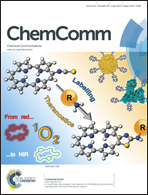The role of copper ions in pathophysiology and fluorescent sensors for the detection thereof
Abstract
Copper ions are indispensible to life and maintaining tight control over the homeostasis of copper ions in the body is a prerequisite to sustaining health. Aberrations in normal copper levels, both systemic as well as on a tissue or cellular scale, are implicated in a wide range of diseases, such as Menkes disease, Wilson's disease, Alzheimer's disease, Parkinson's disease and transmissible spongiform encephalopathy (prion diseases). The current understanding of how copper influences these diseases is described. The field of fluorescent copper sensors both functioning via a reaction based mechanism as well as by directly binding copper ions has known an inflation in recent years, and the importance of this field to elucidating the role of copper in cell biology is pointed out. Progress in these tightly interwoven fields has resulted in a better understanding of a number of diseases related to copper imbalances and current developments might open the path for novel and innovating therapies to address these diseases.



 Please wait while we load your content...
Please wait while we load your content...